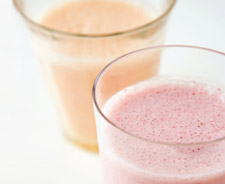Protein powders that power
This article was originally published in January 2012

Protein powders offer a simple way to increase the ratio of protein to carbohydrates in your diet. From more traditional whey powders to newer plant-based options, many formulations abound. Here’s a quick look at what you’ll find in the health and body care department at PCC.
The popular whey
The most common protein powders contain whey — a byproduct of cheese making that is a “perfect protein” — which helps support muscles and provides antioxidant protection. All of the whey protein powders available at PCC are made from milk that is free of artificial growth hormones. PCC Show Me the Whey delivers 18 grams of protein per serving and is available in Vanilla and Chocolate. Also try Natural Factors Whey Factors protein, available in Matcha Green Tea and other flavors.
Seeds with clout
Hemp seeds and pumpkin seeds are at the forefront of plant-based protein powders. Hempseed protein contains all the essential amino acids along with omega-3 fatty acids, fiber and minerals. Plus hemp is grown easily without pesticides or herbicides, making it a sustainable crop. Try Nutiva Organic Hemp Protein as well as Living Harvest Organic Hemp Protein Powder, made in Portland, Ore. Omega Nutrition Certified Organic Pumpkin Seed
Powder has a mild, slightly nutty flavor and contains amino acids along with a host of other benefits. Read more about the nutritional qualities packed into pumpkin seeds. Learn more »
Single-scoop meals
A number of protein powders are designed to be a complete meal replacement and incorporate a multitude of vitamins and minerals. At the center of several of these blends are rice and pea proteins; when combined, the two provide all the essential amino acids. Sequel offers Vega One — a vegan mix that contains probiotics, calcium, omega-3s, fiber, iron, antioxidants and protein and is free of common allergens. Try Vanilla Chai or Berry. Alive Ultra-Shake Pea Protein from Nature’s Way is a comprehensive whole food multivitamin that also is packed with nutrients.
Protein powders always marry well with smoothies but that’s not the only way to incorporate them into your diet. They can be used in baking, adding a boost of protein to cookies, muffins and more.
